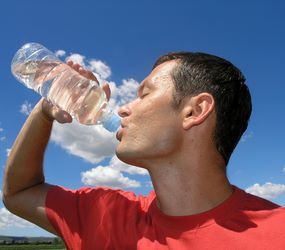Often we forget how important it is to stay hydrated. Not drinking enough fluids comes with many consequences, including: an increased risk of infections such as urinary tract infections, a delay in wound healing, constipation, confusion and falls. Keeping hydrated is not only important in the summer months but all year round too. 2015 marks the 4th Nutrition and Hydration Week, a global initiative to promote food and drink intake in health and social care. Love Your Gut thought it would be a great opportunity to put together some top tips for staying hydrated in 2015.
1) Aim to drink around 1.6 – 2 litres of fluid per day, that’s around 8 glasses. How much you need to drink can also depend on the climate and your level of physical activity. So if it’s a hot summer’s day and you are taking part in lots of exercise make sure you are increasing your fluid intake.
2) Avoid large amounts of alcohol, as it can dehydrate the body. Although many of us like to enjoy a cocktail on a summer’s day, it is important to ensure you are also drinking other fluids throughout the day to prevent dehydration.
3) Vary your fluid intake. It’s not only water that keeps us hydrated. Try other fluids too, such as herbal teas, milk and juice. However, bear in mind the overconsumption of some fizzy drinks and fruit juices is not advised due to their high sugar content, so try to stick to water where possible.
4) Always keep fluids close by. If you’re out and about on a busy day it’s often easy to forget to have something to drink. Keep fluids in easy access by carrying around a bottle of water or keep a glass of water at your desk to sip throughout the day.
5) Make the most of your friends and family. As with eating, drinking is also a great way to be sociable and is often not enjoyed as much when alone, so why not invite some friends and family round for a cup of tea?
6) Increase fruit and vegetable intake. Not only are fruit and vegetables great for vitamins, minerals and fibre but they also contain lots of water. Try to include them daily in your diet to stay hydrated and healthy.
7) Consume hydrating meals. If you’re struggling to drink large amounts of fluid you can try consuming more hydrating meals such as soup, which is perfect for staying hydrated in the winter months.
8) Monitor fluid loss. You can monitor fluid loss by checking the colour of your urine. Your urine should appear a pale yellow colour. A dark yellow appearance to the urine can indicate dehydration so pay close attention in the loo and increase your fluid intake accordingly!
For further information on dehydration make sure you visit the NHS website: http://www.nhs.uk/Conditions/Dehydration/Pages/Introduction.aspx
For more information on Nutrition and Hydration Week and events which may be taking place near you visit: http://nutritionandhydrationweek.co.uk/



